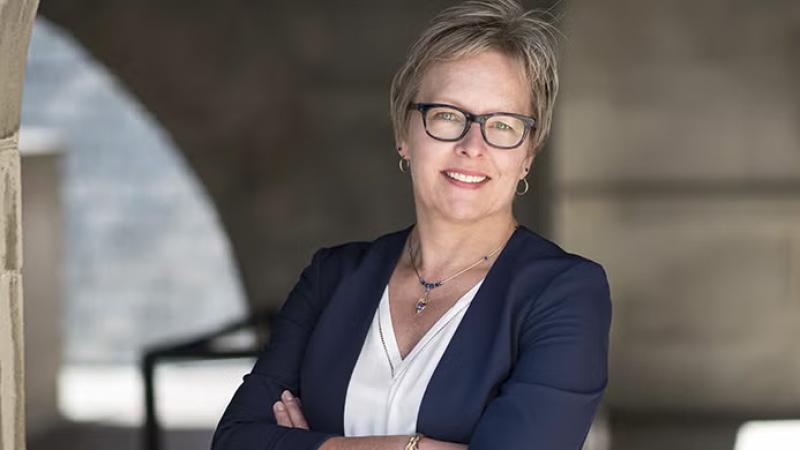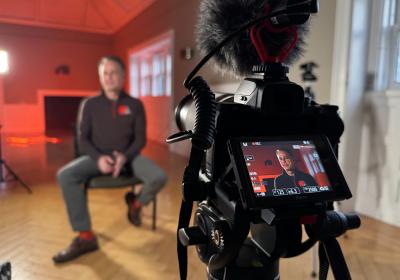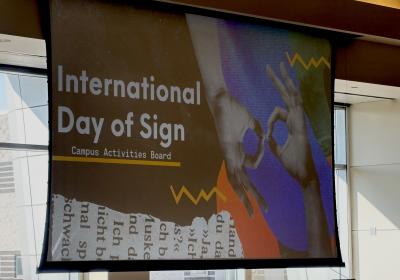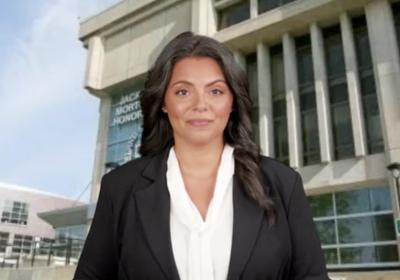
President Bloomberg discusses CSU United, the budgetary deficit, SB1 and more in Stater interview
Cleveland State University President Laura Bloomberg, Ph.D., discussed her goals for CSU, and reflected on issues such as Ohio Senate Bill 1, the school's budget deficit and more in an interview April 1 with the Editors-in-Chief of The Cleveland Stater.
Cleveland State United strategic plan
Bloomberg opened by acknowledging the fact that her job isn’t easy, especially in the current political climate, but that she wouldn’t change her career despite that.
“I wouldn’t have chosen all the challenges we’re grappling with right now,” Bloomberg told the Cleveland Stater. “But I did choose a profession that was going to have a lot of challenges and turmoil in it. That’s just the nature of higher education in America.”
One of the ways Bloomberg is aiming to improve the nature of higher education at CSU is through the Cleveland State United strategic plan, which simply states the goals for CSU from now through 2030 in one page.
“One of the things that makes me really proud about Cleveland State United is just how many people were involved, how many voices were heard and how much input went into it,” Bloomberg told The Stater. “It’s not my strategic plan, it’s ours.”
Two of these changes that are being implemented under Cleveland State United is assigning each student an academic coach, which Bloomberg said will help students with scheduling and general support, and rolling out a new core curriculum model.
“We will have a merged model of academic coaches. Every student should have access to an academic coach who will both advise them on classes, but also coach them, support them and be in their corner,” Bloomberg said. “That’s one of the things we’re focused on.”
Budget
Facing a ballooning budget deficit, CSU has been working during Dr. Bloomberg's tenure as president to balance its finances.
Last spring, CSU offered faculty buyouts, which resulted in almost 10% of all faculty departing, as well as closing or merging upwards of 40 academic programs. Bloomberg said these changes were only possible due to the school's openness about the problems it faced.
“We chose to be transparent," she said, "And in doing so, we’ve done things this past year that were really hard and painful, but we did it in a way that was inclusive and we had a lot of voices involved."
Bloomberg told The Stater that the board of trustees will be submitting a balanced budget to the state this May, but that CSU's finances remain fragile and must continue to be carefully reviewed in the future.
“We’re never going to be done. We’re always going to have to be really careful about balancing our budget to align with our students,“ Bloomberg said. “We now have, I would say, the discipline of knowing how to do it inclusively and wisely.”
Senate Bill 1
Ohio's Gov. Mike DeWine signed into law on March 28 the Advanced Ohio Higher Education Act, SB1, marking the start of a 90-day period for universities to implement changes accordingly. This bill requires changes such as the ending DEI litmus testing for faculty hiring, prohibiting faculty striking and more.
In contrast with the state's flagship public university, OSU, Bloomberg ruled out preemptive compliance with the bill, saying CSU would make informed decisions about how to implement SB1.
“I did not think it was a great idea for this university to preemptively change anything,” Bloomberg said. “We didn’t preemptively close offices, we didn’t do those kinds of things. We have 90 days to interpret and make wise decisions in alignment with the law and in honor and respect for our students and our strategic plan.” \
CSU's president said that she’s not in favor of everything on the bill, but has spoken to its sponsor, Sen. Jerry Cirino (R-Kirtland), about SB1 and said she will work to implement the law at CSU accordingly.
“I think we have a cordial relationship,” Bloomberg said. “He knows that I’m not wholly in favor of this bill, but I also understand the law and we will follow the law. But there are some specific questions that we have to have answered about the implementation of the law that is still ambiguous.”
One of those things is the faculty litmus test, which Bloomberg said has always been a requirement at CSU and is necessary to ensure the academic freedoms of the university.
“I think that there should always be a litmus test for what is taught as it relates to the grounding, the theoretical framework, the research and the relevance of the topic to the students,” Bloomberg said.
“In terms of the topics that a faculty member teaches in the classroom, we need to be sure that we’re protecting academic freedom and we need to be sure that we’re protecting what is academically sound.”
One of those questions that many students have is about the removal of Diversity, Equity and Inclusion (DEI). At CSU, the Division of Student Belonging and Success operates in place of a designated DEI office, which Bloomberg renamed when she became president, and said it should not be affected by the implementation of SB1.
“Certainly my support of diversity, equity and inclusion isn’t in question, and wasn’t my question in my decision,” Bloomberg said.
“I thought about what was in that division and I thought if I’m a student, what does it say to me? What does it tell me about what you do as it relates to me?" she added. "So we pulled that whole division apart, we moved things around, we reclaimed students in the center and built the division of student belonging and success.”
According to Bloomberg, no student organizations are in talks of being shut down, as long as they continue to remain open to all students as they are now.
New Center for Civics, Culture and Society
Peter Koritansky, Ph.D., will be joining CSU on June 1 as the new director for the Center of Civics, Culture and Society, which will be funded by the state government to the tune of $2 million.
Bloomberg said she’s excited for students to meet Dr. Koritansky, while addressing the concerns that some university members had about financing this center.
“This was, as you know, in last year's budget bills, so it’s not a part of SB1 to establish these centers and there were some universities around the state that were given these centers with a budget to follow and guidelines to hire,” Bloomberg said. “The center isn’t set up yet. It will be this summer when Koritansky joins us.”
Bloomberg said it was not CSU’s decision to set up the center, but something the state mandated. She plans on working with Dr. Koritansky to ensure that the center is set up for success at CSU.
If the state stops funding the center at any point, Bloomberg said CSU will not contribute the funds internally to keep the center up and running, as it does not fit into the budget at this point.
Discontinuation of sports programs
CSU announced Jan. 23 that three NCAA sports programs -- men’s wrestling, women’s golf and softball -- would be discontinued due to budgetary reasons.
Bloomberg said she addressed Republican Sen. Bernie Moreno and his letter to her about the decision to cut wrestling and a call to reinstate the program. Moreno's letter made no mention of women's golf or softball. But Bloomberg said there is no plan to reinstate any of the three programs at this time.**
“An eleven million structural operating deficit was nothing to sneeze at,” Bloomberg said.
“You can’t just close this kind of a deficit with what we, kind of sarcastically, call a peanut butter approach. If I’m just going to cut 25% off of everything, everything suffers.”
Bloomberg, however, did express condolences for those athletes affected, but clarified that CSU is an academic institution first.
“Those are painful decisions and presidents don’t win any popularity contests for doing that,” Bloomberg said.
** Editor's note: The Stater interview came ahead of news that the state is considering an amendment to the Ohio budget that could bale out wrestling.













